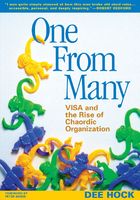
第4章 Introduction
Today, before any audience in the world, I can hold a Visa card overhead and ask,“How many of you recognize this?” Every hand in the room will go up.When I ask,“How many of you can tell me who owns it, how it's governed, or where to buy shares?” a dead silence comes over the room. Something incredible happened, but what, and how?
In 1969, Visa was little more than a set of unorthodox convictions about organization slowly growing in the mind of a young corporate rebel. In 2004, its products are created by 21,000 owner/member financial institutions and used by more than a billion people to purchase $3.2 trillion of goods and services at 20 million merchant locations in more than 150 countries, the largest block of consumer purchasing power in the global economy. For thirty-five years, it has grown from 15 to 50 percent, compounded annually, with no end in sight.
But this book is much more than the story of the scarcely believable events that brought Visa into being and led to its extraordinary success. It is also the story of an introverted, smalltown child, passionate to read, dream, and wander the woods, the youngest of six, born to parents with but an eighth-grade education. It's a story of crushing confinement and interminable boredom in school and church, along with sharp, rising awareness of the chasm between how institutions profess to function and how they actually do; what they claim to do for people and what they actually do to them. It's about three compelling questions arising from that awareness:
Why are institutions, everywhere, whether political, commercial, or social, increasingly unable to manage their affairs?
Why are individuals, everywhere, increasingly in conflict with and alienated from the institutions of which they are part?
Why are society and the biosphere increasingly in disarray?
It's a story of a lifelong search for the answer to those questions, which had everything to do with the formation of Visa. It's a story of harboring four beasts that inevitably devour their keeper; ego, envy, avarice, and ambition; and of a great bargain, trading ego for humility, envy for equanimity, avarice for time, and ambition for liberty. It's a story of events impossible to foresee, that sent a man of seventy on a journey more improbable than Visa, and infinitely more important.
Beyond all else, it's a story of the future; of something trying to happen; of a four-hundred year old age rattling in its deathbed as another struggles to be born. It is not just my story, although I am in it. It is not just your story, although you are in it. It is a story of us all.